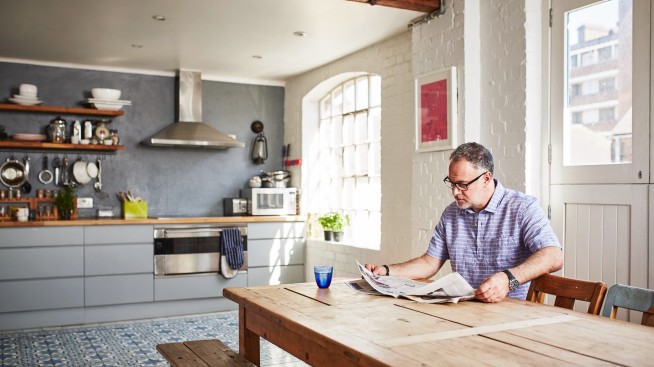10 tips for first-time homebuyers

Buying a home for the first time can be exciting. But there are a lot of new processes you’ll experience and people you’ll need to work with, too. Here are 10 of the top first-time homebuyer tips to help guide you through your journey from start to finish.
1. Identify your needs
You may have always dreamed of a two-story house with a grand staircase and a large yard, but have you considered what you truly need in a home? Where you are in life right now and where you’re planning to go in the future may not be the same as where you thought you would be when you first dreamt of buying a home.
Do you need a separate bedroom for each of your kids, or does it make more sense to find a home where your children can share a bedroom and you can have space for a home office or playroom? Are you willing to travel farther for work if it means buying a home in a specific neighborhood, community or school district? Does a townhouse or condo make more sense than a single-family home for your family's needs and lifestyle?
Take the time to consider what your current needs are and what your needs may be in the future. Then make a list of the things you need and want in your new home. Having a clear understanding of your housing needs helps you identify the most important things to look for when viewing homes.
2. Know the true cost of your new home
Make sure you know what your new home will really cost. Your true housing cost includes more than your mortgage payment. A good first start is to use a mortgage calculator to estimate your monthly payment.
You also need to add in the costs of any property taxes and homeowner's insurance. In addition to your monthly payment, you should also consider the cost of home maintenance, such as taking care of the lawn and yard, maintaining appliances, unplanned repairs or replacements and any Homeowners Association fees if applicable. Do not forget to consider utility costs like electric, gas, water and sewer which could drive up your monthly costs. You can use our affordability calculator to help you determine how much you can comfortably afford based on your income and debt.
3. Build your savings now
Don't wait until you've found the house you want to buy — start saving now. You can start by setting up an automatic transfer to your savings account from each paycheck. You can also use your savings account to set aside bonuses you earn at work and tax refunds.
Then, look for areas in your current spending where you can cut costs. For example, packing a lunch to bring to work can cut down the amount of money you spend on food every month.
Building your savings account now is important because there are many expenses you will need to pay for throughout the homebuying process. These include deposits, home inspections, appraisals, down payments and closing costs. Boosting your savings account now also helps you prepare for expenses that can occur after you move in, such as decorating and unplanned maintenance and repair costs.
4. Build your credit wisely
When you’re preparing to buy a home, you need to be smart with your credit. Lenders use your credit score as a key factor to determine whether or not to approve you. They also use it to determine the interest rate and loan terms they’ll approve you for.
Avoid common credit mistakes that many first-time homebuyers make, such as:
- Taking out a new line of credit: Avoid opening new credit lines. Buying a car or opening a new credit card shortly before you apply or close on your new home can negatively impact your score.
- Avoiding credit altogether: While you don't want to open new accounts right before you buy a home, you need to have positive credit accounts to help you build a good score. Use your credit wisely to keep contributing to your score.
You can request a free copy of your credit report from each of the three major credit bureaus once a year. Alternatively, you can use Chase Credit Journey to check your credit report, dispute errors and look for opportunities to improve your score
5. Research your mortgage loan options
While many people think a conventional loan is their only option for buying a house, you have several different mortgage loan options available to you. These include FHA loans and VA loans. Most lenders also offer the option of choosing between a Fixed Rate or an Adjustable Rate (ARM) Loan. Each mortgage loan option has its pros and cons. Consider working with a home lending advisor to find the home lending option that fits your unique circumstances.
6. Know what you qualify for before you begin shopping
Did you know you can find out what you can qualify for before you even begin looking for a house? You can get preapproved for a home loan with a simple conversation with your mortgage lender about your income, credit, employment and asset information. Getting preapproved for a mortgage loan can help narrow your search because you’ll already know how much you can finance.
7. You don't have to do this alone
Hiring a real estate agent means you don't have to go through the homebuying process alone. As a valuable partner, they’ll work with you to ensure your needs and best interests are met throughout the purchasing process. Choosing an experienced agent who will represent you as the buyer helps ensure they’ll work in your best interest when finding homes and negotiating purchasing terms.
8. Make the decision in your own time
You might feel like you need to quickly put in an offer on a home, or to accept rates or terms without knowing what other lenders might offer. It's okay to take your time to understand how everything works. Know what your options are and carefully think things through before you make any decisions.
Rather than deciding based on emotion, make sure you’re well-informed and take your time to carefully consider any decision you make about buying a home.
9. You don't have to pay the seller's asking price
You don't have to make an offer for the full asking price on the home you want to buy. As a first-time homebuyer, rely on your real estate agent's advice to determine how much you should offer. Ask your agent to help you make an offer that’s competitive but also within your budget and reflective of the home's value.
There may also be room for negotiation when making an offer to buy a home. Your real estate agent may be able to help you negotiate terms where the seller agrees to pay closing costs or cover costs of repairs found during the inspection.
10. Prepare for closing
Once the seller accepts your offer, there’s still a lot to be done before you close, like getting a home appraisal, completing a home inspection, doing a final walk-through and completing paperwork related to your loan.
On closing day, you’ll complete the legal and financial paperwork needed to complete the transfer of your funding to the seller and of the home's title to you. You should prepare to pay between 2% and 6% of the home's purchase price in closing costs, unless you (or your agent) have negotiated for the seller to cover all or some of these costs. Your lender will provide you with a breakdown of all costs prior to closing.
It’s important to make sure there are no changes to your financial status during this time to help the closing process move more smoothly. As you go through the process, make sure you carefully read any documents you receive and ask your real estate agent or attorney to explain anything you don't understand.
There's a lot to keep in mind when buying a home, but it's all worth it in the end. Knowing what the process involves, and how to handle whatever comes up, is a great way to arm yourself for this exciting journey. For more homebuying tips, or to find out whether you qualify for a mortgage, speak to one of our expert home lending advisors.



